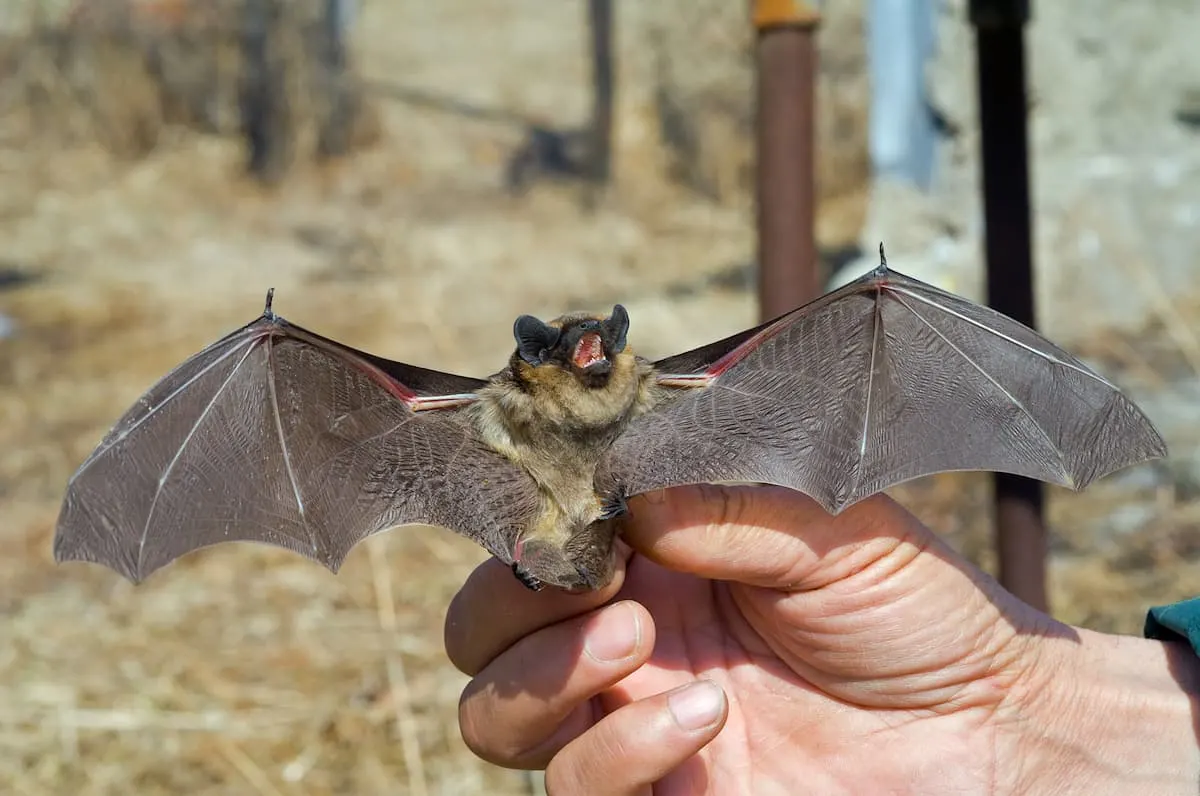Cats are known for eating all kinds of things. Whether it be bugs, mice, or fish, there’s always something unique about a cat’s appetite. The idea of cats eating bats has also brought up some interesting thoughts too. Besides, catching the bat in the first place is an amazing feat of its own. So let’s dig into the following question; do cats eat bats?
Yes, cats eat bats. Generally, it’s not safe for cats to eat bats as they can contain diseases such as rabies.
Although cats do eat bats, it’s not something that happens regularly. Bats tend to fly high and rarely make it low enough for a cat to have an attempt at it. However, it still can happen. We’ll break down why eating bats might be dangerous for cats, and what you can do to protect your cat.

Can Cats Get Sick From Catching A Bat
Yes, cats can get sick from catching a bat. Bats are known to carry various diseases such as rabies. When a cat catches a bat it may accidentally claw it in the process.
That can expose the fluids inside the bat which your cat may accidentally ingest. Let alone, if your cat were to catch a bat and start biting away at it, they could be in just as dangerous of a situation.
Your cat does not need to eat a bat in order to become infected by whatever diseases the bat is carrying around.
In most cases, rabies for example would be transmitted through the animal’s saliva. So, if your cat ate just the head of the lower portion of the bat, the chances of infection are quite low. However, if your cat ate the head of a bat, the risk increases.
What Happens If A Cat Eats A Bat?
If a cat eats a bat it might become sick shortly after. Some symptoms of a sick cat include:
- vomiting
- diarrhea
- swelling of the mouth
- stomach pain
- choking
Also, understand that when a cat eats a live bat that the chance for bacteria to travel increases too. Yes, it is meat, but it is not clean nor cooked.
Can A Cat Get Rabies From A Bat
Yes, it is possible for a cat to get rabies from a bat. However, the likelihood of a cat getting rabies from a bat is quite low.
Rabies travels mostly through animal saliva. So, it depends quite a bit on which part of the bat was eaten, how much of it was eaten, and of course, if the bat is carrying rabies, to begin with.
If you suspect your cat has eaten a bat and want to ease your mind, you should get your cat tested. A good vet will test both you and the cat for rabies. If your cat is positive, a rabies booster will be administered to your cat.
After the booster is administered there’s a waiting period. Usually, 45 days or more is the waiting period so you can see how your cat reacts to the booster.
Now, if your cat does not get the booster and has eaten an infected bat, then they need to undergo a strict quarantine. This can last six months or longer, but it’s important to protect both you and your cat.
Unfortunately, if your cat is not vaccinated for rabies or does not get the booster, then they may need to be put down.
Is It Okay For A Cat To Kill A Bat
It is not okay for a cat to kill a bat. Not only can the bat carry diseases, but it’s also an avoidable interaction if you monitor your cat appropriately.
If your cat does kill a bat, it’s important to retrieve the bat as soon as possible. Don’t allow your cat to leave the cat outdoors where other wildlife may come into contact with it. This will only spread the risk of bacteria and disease if the bat is carrying anything.
It’s your job as the pet owner to safely retrieve the bat, and then take it in for testing. You may want to also start a mandatory quarantine of your cat, ensuring they cannot bite or lick anyone while you sort the situation.
How Do Cats Locate Bats
Cats locate bats in a few ways. Below are some of the common locations you may find a bat in and around the home:
- Attics
- Trees
- Cracks and holes in the home
- Gaps in roofs and chimneys
- Outside near forests and waterways
- Barns, sheds, and other small closed structures
- Basements
If you have an outdoor cat, the chances of your cat running into a bat increases significantly. An older home that’s not well maintained and has easy access due to holes and cracks can certainly attract bats, especially to those dark areas.
With exceptional hearing and sense of smell, it’s not difficult for a cat to find a bat in and around the home before you do.
Because cats are so good at locating bats, you might be thinking they could easily get rid of the bat problem for you right? Well, that’s not necessarily what you want, especially considering the health risks bats present to cats.

Do Cats Get Rid Of Bats
Yes, cats can get rid of bats. However, it is not recommended to use your cat for that activity. Not only could your cat get sick, but it can also suffer from injuries.
Most bats fly high, which means your cat would end up at heights that may be unsafe for them. Falling from a tree or rooftop trying to attack a bat is not an ideal situation for any cat. As agile as they are, the injuries and risks associated are just not worth it.
On top of that, bats simply are not afraid of cats. As a whole, bats are not aggressive by nature. Even rabid bats are known to be calm by nature. They don’t attack humans or pets really. However, if a bat is provoked it could bite.
If you are trying to get rid of bats there are plenty of other methods that work more effectively and would keep your cat safe in the long run.
Below are a few ways you can safely get rid of bats without involving your cats:
- Fill holes and seal cracks
- Use bat repellent
- Remove food from your garden
- Use bright lighting
- Use a pest control service
All the above-mentioned options are much better than risking the health of your cat. It’s essential to fill and seal cracks in your home where a bat could easily get through. The last thing you want is bats living in the attic and your cat discovering them.
Bat repellent sprays are effective too, just be sure to use them in locations where your cat would not come into contact with it. Bright lighting is also a nice deterrent for bats.
And lastly, if a bat issue is truly disturbing your property, it might be time to call in professional pest services. This is especially important if you feel it’s only a matter of time that your cat will come into contact with bats.
Are Cats A Threat To Bats
Generally, cats are not a threat to bats. A cat’s first instinct is not to harm a bat. If anything, they will be curious and want to play with it if they do catch one.
More aggressive cats may see the bat as a threat, however, especially if it is flying around frantically. Bats have teeth too, so it’s possible your cat could be bitten in the process.
In terms of whose more powerful, yes, cats could be more of a threat to bats. They can easily kill them if they were to catch one. However, the long-term health issues bats present to cats make them more dangerous.
What To Do When Your Cat Catches A Bat
Eventually, your cat may end up catching a bat. When this happens there are a few things you can do:
- Lure your cat away from the bat with treats
- Secure the bat with safety gloves
- Place your cat in a mandatory quarantine
- Call the vet and get your cat and the bat tested immediately
That’s really there is to it. The last thing you want to do is leave the bat exposed to other creatures. You also don’t want to dispose of the bat as it’s important to know if traces of any infections are going to be present in your cat.
Final Thoughts
In the end, cats will eat almost anything. They are carnivores and are naturally attracted to animals of all types. Just because your cat can catch a bat and eat it doesn’t mean they should though. You should take careful consideration into how you monitor your cat’s whereabouts, especially if it’s an outdoor cat.
Bat proofing the home and surrounding area is essential. With pest control and repellent options available, there’s no reason to allow your cat to come into contact with a bat in the first place.
If at any point your cat does come into contact with a bat don’t panic. Be sure to follow those essential steps of securing the bat, isolating your cat, an then getting tests ran and medicines administered if necessary.

My name is James, and welcome to FAQCats!
Along with our team of cat owners, expert pet enthusiasts, and pet professionals, we aim to write engaging helpful, engaging content about cats. At FAQCats we strive to provide content that’s accurate and fun to read. Our team writes about everything related to cats; even the most complex of topics. Through extensive research and caring for our own fur-pals, we’re able to provide something cat owners worldwide will love. Have a look around, and leave us feedback anytime!

